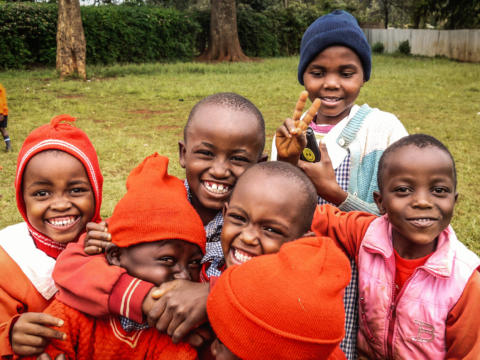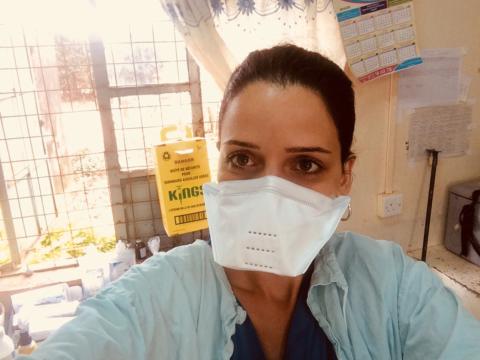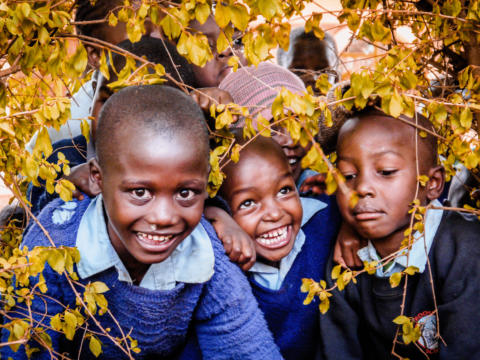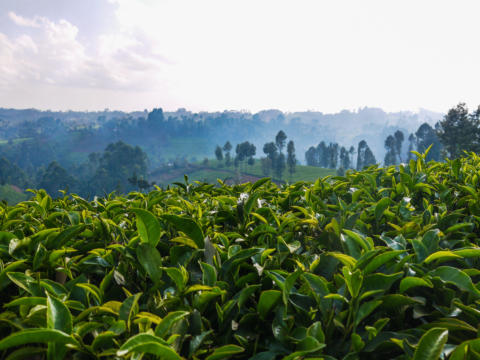Only 360€ per week!
Kindergarten
Gatanga Village - Kenya
Share basic concepts at a kindergarten in rural Kenya! Help out the local teachers by taking care of the kids, arranging activities and more!
In this program, you will be assisting teachers at a rural school in Kenya to children aged 3-6. Besides sharing your knowledge of basic English, numbers, colors, etc., you will also help out with caretaking in the classroom and creating educational activities for the children such as drawing, singing, and more.
Program Description
During your time at this program, you will be working with small children (ages around 3 to 6 years old) at local kindergartens spread around the Gatanga area.
Each class at the kindergarten is quite packed, with an average of 30 children per classroom! So the extra hands are certainly appreciated by the local staff.
You will collaborate with local teachers and assist them while they manage their class. But you will also have the opportunity to lead groups and create your own activities such as drawing, coloring, games, etc. So get creative!
Your main aim should be to practice English with the children through the use of creative expression; stories, poems, songs and games.
Even though the English language is widely taught in Kenya, the chance to practice it may not happen often enough in some of the rural areas. The ability to master English can greatly improve the life prospects for many local children.
Aims & Objectives
- Improve the English skills of the local children
- Provide extra hands to assist the kindergarten’s staff
- Give you an invaluable experience in a rural Kenyan kindergarten
Schedule
Monday to Friday
You will be assisting in the kindergarten 4-5 hours each day with a break in between. In the afternoon, you will have time to prepare for the next day’s activities and lessons before dinner time. The day could look like:
- Breakfast at the accommodation
- Engage children in creative learning activities and assist local teaching staff
- Morning break at the program
- Engage children in creative learning activities and assist local teaching staff
- Help local staff with serving lunch to the children
- Lunch at the accommodation
- Prepare lesson plan for the next day
- Free time
- Dinner at the accommodation
Note: This schedule can be changed and/or amended depending on weather conditions, local conditions and unforeseen circumstances.
Participant Criteria & Requirements
Standard Requirements
Minimum age: –
Maximum age: –
Minimum English level: Basic
CRB required: On Signup
Passport copy required: No
Resume copy required: No
Required qualification: None
Additional Requirements
There are no further requirements.
Additional Equipment
- Teaching materials such as:
- Games, books, colored pencils, etc
- Pictures from your country, family and friends
- Small cultural objects from your country of origin
- Modest or business casual attire – fully covering the knees and shoulders is required while on the Kindergarten site and while interacting within the community. No sheer (see-through), low cut or midriff revealing tops, mini skirts or offensive/questionable writing on garments are allowed.
Location
Gatanga Village will be your new home and will give you the chance to see authentic rural Kenya. Close by is Thika, an industrial town where you will be able to find anything you need. Nairobi is not too far either, and you can head there during the weekend for nights out or sightseeing. Likewise, there are many natural areas in close proximity to Gatanga, a simple example are Fourteen Falls, a set of waterfalls that will leave you awestruck.
About the Accommodation
You will be accommodated in our center. All participants are expected to be environmentally aware and use all resources with restraint, especially water, paper and electricity. Sometimes there are power and water cuts during the day, but do not panic. This is life in the village. This is a very simple local accommodation, but you will have all of the necessities while here. You will have meals provided and rooms cleaned on the weekends, but you will also be expected to clean up after yourself and play your part in keeping the accommodation neat and organized. The location is not far from the Police station and a short walk to local market and shops. When interacting with the local community it is important to note that smoking is not accepted in public areas or even within the sight line of children or local officials. Style of dress in the community is fairly conservative. Short shorts, mini skirts and sleeveless tops are not considered appropriate for the culture of the village.
Please be advised that in the event of an excess number of participants, we may use other local accommodation in the area that meets a similar standard as described herein.
Food Arrangements
Food served will mainly be Kenyan food, which consists of vegetables, potatoes, eggs, bread, pancakes (commonly known as “chapati”) and fruits such as oranges, bananas and avocados.
Facilities
Thika town is located a thirty minute drive away from our center and is filled with supermarkets, shops, ATMs, local markets and good restaurants. There is local transport available in Thika such as bicycle and motorbike taxis, van taxis and buses. Vehicles called “matatus” very tightly packed minivans can be found near the local market throughout the day which can drop you off in Thika town. Moreover, the bus “station” (central location for minivans and buses) in Thika is your launching spot for trips into other parts of Kenya.
Note: Please expect shops to be closed on Sunday as many people do not work that day.
Activities & Events
No scheduled activities outside the program.
Sights & Surroundings
There are many places for you to visit during your free time. For example, you can visit the Fourteen Falls in Thika, go hiking in Kenya Mountain, visit Mombasa and enjoy the beach or head for a weekend of sightseeing in Nakuru or Nairobi, which are filled with national parks. Nairobi is also the nightlife hub of Kenya.
Transportation
From this location we do not provide free transport to other locations.
Quick Facts
Name: Republic of Kenya
Population: 45 million
Capital: Nairobi
Language: English, Swahili
Currency: Kenyan Shilling (KES)
Time zone: UTC +3
Country Information
The first thing that might pop to mind when thinking of Kenya are lions, zebras and leopards. However, this vast country has much more to offer. With 40 national parks and reserves scattered around the country, Kenya features almost every landscape and activity that you can imagine and it will suit any type of traveller’s palette.
Undeniably, safaris are the core of tourism in Kenya, but you might also venture in deeper and discover the Maasai, a semi-nomadic tribe known for its color-filled adornments. Nairobi is another destination to explore, with its bustling nightlife and unique vibes. For those who love nature, a visit to the Great Rift Valley is a must. And for those who enjoy chilling at the beach, Kenya’s coastal area covers almost 80,000 square kilometers and remains sun-filled during most of the year!
Climate
Kenya is a big country and its climate varies from tropical along its coast to arid in the north and quite temperate inland. Kenya receives a large amount of sunshine year-round but generally, the hottest period is considered take place in February and March while the coldest one between July and mid August. The “long rains” season happens between March and June, while the “short rain” season is between October and December.
Culture
Over the course of history, Kenya has been the hub of migration and henceforth, the country has become one of the most diverse culture and language-wise.
The country has over forty different ethnic groups, including Luo, Kamba, Maasai and more. Each speaks a variety of mother tongues, although Swahili remains the most widely spoken language. Moreover, European, Arab, Indian and Pakistani groups who came to the country in the 19th century can be added to the mix of diversity.
Even though religions such as Christianity and Islam are widely spread, many still believe in the ancestor world, where the dead have an impact on the lives of the living.
Today, Kenya’s culture, including forms of dress, music and food sees its strong influences from other parts of Africa, India, Europe and the United States. However, in certain parts of the country, many communities retain their traditional lifestyle and culture and people still wear clothes, skins, jewelry as they did centuries ago. Many remote tribes remain absolutely isolated and indigenous as
Gastronomy
Traditional Kenyan food are known for consisting corn, potatoes and beans. A staple dish is Ugali, a porridge made out of maize. Another typical delicacy is irio, a blend of corn, beans, potatoes and beans dipped into meat or vegetable stews.
Transportation
Plane
Kenya Airways offers daily flights between Mombasa, Malindi, Lamu, Kisumu and Nairobi. Likewise, another popular choice is Air Kenya, which flies regularly between Nairobi, Mombasa, Malindi, Lamu, Amboseli, Maasai Mara, Meru, Nanyuki and Samburu.
Bus
Kenya has a large bus network between many destinations, but be advised that roads are bumpy. For safety reasons, we highly advise to use long distance buses only during daytime.
Minivan
Minivans, known as “matatus” in Kenya are another way to get around for short and medium distance travels. Taking a matatu is a must to experience the real Kenya as they are often decorated in colorful and fascinating colours. You can hail a matatu on the side of the road and in this day and age, the network is easier to figure out than ever as routes and schedules are provided on Google Maps.
Train
The train in Kenya is often dubbed the “Lunatic Express”. It travels between Nairobi and Mombasa three times a week. It is undeniably a great experience to travel by train but if time is an issue, we advise you to go for another method of transportation as the train has a bad reputation for being extremely slow and often delayed.





